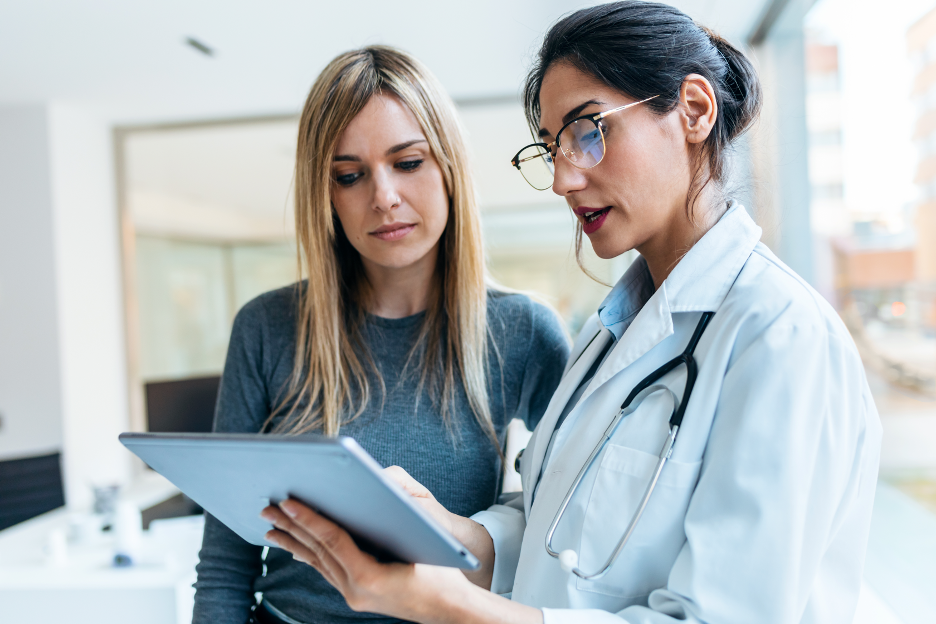Most women know how their breasts usually feel. So, when they see a new lump, it can feel scary. Is it dangerous? Could it be cancer? Should you wait a few days or call your doctor immediately?
Below, our OB/GYN specialists in Northwest Indiana are going to discuss some of the key things women should know about breast lumps.
Every lump should be checked.
Most breast lumps are non-cancerous. Some are like cysts. These are small, round, and filled with fluid. They usually come and go with your cycle.
Other times, the breast tissue just feels bumpy or thick. That can happen with hormone changes, especially around your period. It is called fibrocystic change. It is not dangerous, but it can feel strange.
There are also fibroadenomas. These are solid but soft and move easily. They are not cancer and usually happen in younger women. Hormones can make them grow or shrink.
Still, some lumps raise concern. If a lump feels hard, does not move, or has an unusual shape, that is a reason to schedule a visit with an OB/GYN specialist in Northwest Indiana.
You should also look out for changes in the skin. If the lump puckers or looks like an orange peel, see an OB/GYN specialist immediately. Other warning signs include bloody discharge, the nipple turning inward, or a lump under your arm.
Why do lumps form in the first place?
Your breast tissue changes with hormones. That usually happens during your period, pregnancy, and menopause. These changes can make your breasts feel sore or swollen. You might even notice new lumps, but many are not dangerous.
Some lumps form after a small injury. Fat necrosis is one example. This can happen after surgery or even a bump from a seatbelt. The lump may feel firm, and the skin might look bruised. It is not cancer, but it can look like it on a scan.
Mastitis is another cause. It is an infection that usually happens when breastfeeding. The breast gets hot, swollen, and painful. You might also have a fever. It needs treatment. If ignored, it can become an abscess that may need to be drained.
There are also intraductal papillomas. These are small growths inside the milk ducts. They are usually near the nipple and might cause discharge. They are not cancer, but an OB/GYN specialist might want to do a biopsy just to be sure.
And, of course, there is breast cancer. Cancerous lumps are usually firm and oddly shaped. They usually don’t hurt. You might also see changes in the skin, nipple, or breast shape. It is hard to know by touch alone, so it is best to get checked.
When should you visit an OB/GYN specialist?
If a lump is still there after a month, call your OB/GYN. If it changes shape or feels different, get it looked at. New discharge, swelling under your arm, or skin changes are also signs to watch out for.
Even if you have had harmless lumps before, don’t assume this one is the same. Your body changes as you get older. What’s normal at 25 might not be normal at 45. It is always better to be safe.
How are breast lumps diagnosed?
OB/GYN specialists usually take a triple test to figure out what’s going on. First, they will do a physical exam. They will check the lump and nearby areas like your armpit.
Next is imaging. If you are over 40, a mammogram is usually the first test. An ultrasound might be better if you are younger or have dense breast tissue. Sometimes, an MRI is used as well.
An OB/GYN specialist may suggest a biopsy if something still looks unclear. A fine needle test checks if the lump is filled with fluid. A core-needle biopsy takes a small sample. For hard-to-reach spots, a vacuum-assisted biopsy is used.
These tests are usually quick and not too painful. Most lumps don’t need surgery unless they are causing trouble or the results are uncertain.
An experienced OB/GYN specialist in Northwest Indiana will explain each step clearly. They will go over your results and what they mean, then help you plan what to do next.
Looking for an Affordable OB/GYN Specialist in Northwest Indiana?
At 219 Health Network, our OB/GYN specialists in Northwest Indiana are here to guide you through every step of your health journey. Whether you need a diagnostic test or just someone to talk to about your health concerns, we are here for you. Contact us today at 833-219-0001 to get started.


